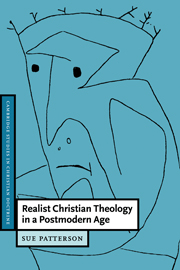Book contents
- Frontmatter
- Contents
- Acknowledgements
- Introduction
- 1 The task of theological realism
- 2 The dilemma of postliberal theology
- 3 Interpreting the truth
- 4 The anatomy of language-riddenness
- 5 The nature of theistic realism
- 6 Becoming persons
- 7 Becoming the Church
- Conclusion
- Select bibliography
- Index of names
- Index of subjects
7 - Becoming the Church
Published online by Cambridge University Press: 02 December 2009
- Frontmatter
- Contents
- Acknowledgements
- Introduction
- 1 The task of theological realism
- 2 The dilemma of postliberal theology
- 3 Interpreting the truth
- 4 The anatomy of language-riddenness
- 5 The nature of theistic realism
- 6 Becoming persons
- 7 Becoming the Church
- Conclusion
- Select bibliography
- Index of names
- Index of subjects
Summary
It is time to draw the theory into the pragmatic reality in which it is tested: the Church. If the Church has to be realist unless it holds the belief that it constructs its own reality, divine as well as human, it is also faced with engaging with a postmodern world, and in its humanness is, of course, itself a part of that world. Most of this inquiry so far has been concerned with how theology, as Christian theory, might do this engaging. With the shift of focus to practice, the investigation of theory continues as the net of investigation widens to include ecclesiology, for according to the model advanced throughout, the nature of the Church is inseparable from its practice.
The Church as personal
Theological realism has often been labelled exclusivist and imperialist. That this accusation is in part justified is due to the realist tendency to regard Christian facts as true for everyone in the same way. As a corrective to this approach, Lindbeck maintains that as we do not know how much (or whether) our ecclesial forms of life – the ‘giant propositions’ of our traditions – correspond to a divine reality, we cannot take their doctrines as being absolute immutable truths cast in concrete, but must regard them as ‘categorially true’ – that is, true for their context. On the other hand, however, he would agree with Lesslie Newbigin and other theological realists that the Christian Church must be universalist (if not exclusivist) in that it ‘points unambiguously to Jesus Christ as the one whom God has set forth to be the given centre of human unity, the one who “through the blood of his cross” can reconcile all people and all things’.
- Type
- Chapter
- Information
- Realist Christian Theology in a Postmodern Age , pp. 137 - 160Publisher: Cambridge University PressPrint publication year: 1999

